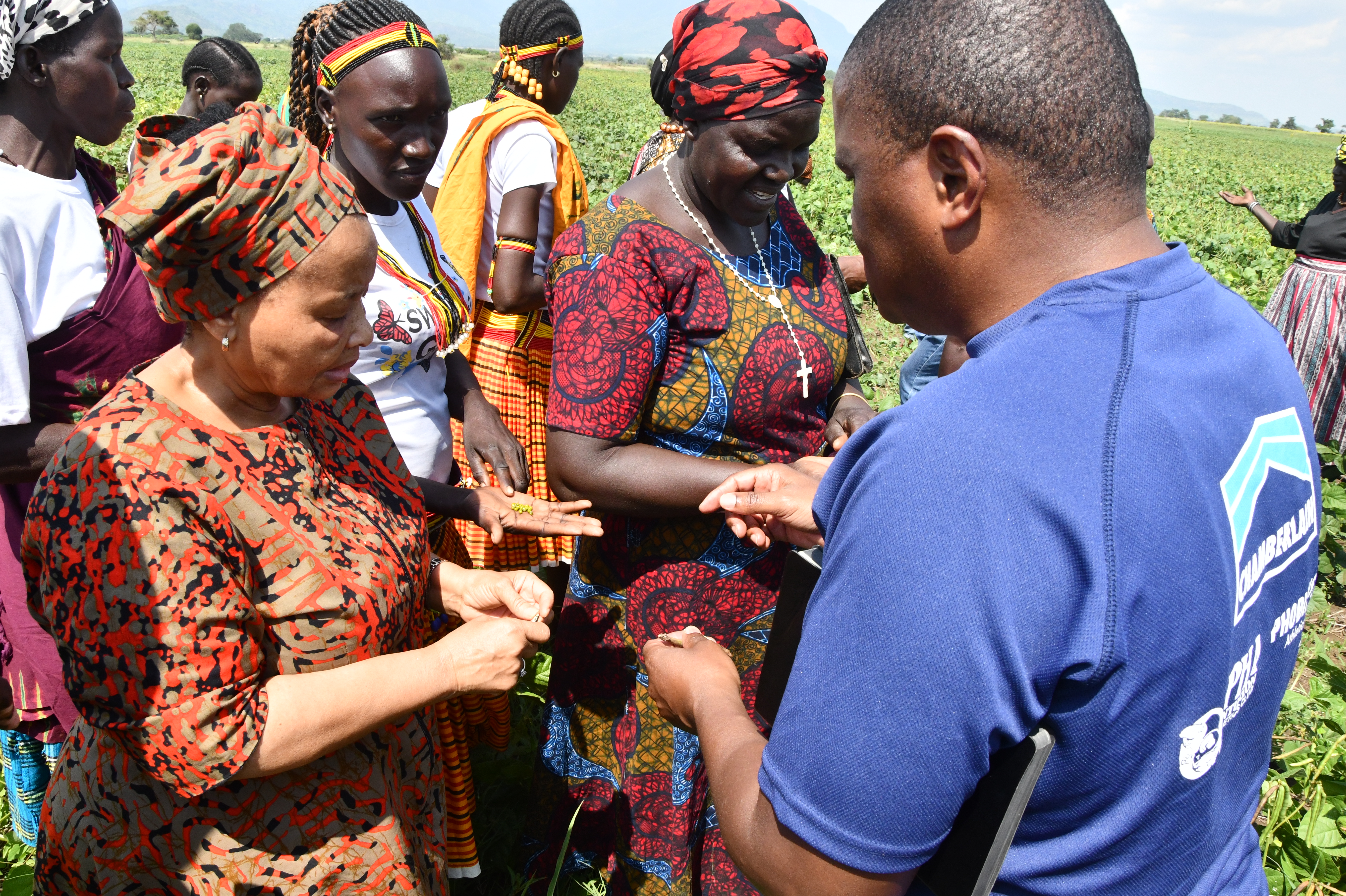UNDP and partners tackling Food Insecurity in Karamoja
August 18, 2023

Image: South African High Commissioner to Uganda H.E. Lulu Xingwana in Nakapiripiriti district through the Karamoja Green Belts Project.
The Karamoja subregion in North-Eastern Uganda has experienced several shocks over the years. Global crises of the past year have escalated the food security crisis in the sub region. While contending with the lasting effects of COVID-19, Uganda experienced new threats arising due to the War in Ukraine and Ebola Virus Disease (EVD) outbreak which greatly affected the subregion and overall economy.
The proportion of the population of Karamoja living in poverty has increased from 60.8 percent in 2016/17 to 65.7 percent in 2019/20, compared to the national average of 20.3 percent, according to the Uganda Bureau of Statistics (UBOS). Furthermore, an estimated 84 percent of young people in Karamoja are experiencing multi-dimensional poverty.
Economic regression, food insecurity, women and youth unemployment and inequality have all resulted in the loss of lives and livelihoods in the subregion. This has created challenges for the country's development prospects and achievement of the Sustainable Development Goals (SDGs) in this United Nations Decade of Action.
The United Nations Development Programme (UNDP) has partnered with the India, Brazil, South Africa (IBSA) Trilateral South-South Cooperation Fund, the Ministry of Agriculture Animal Industry and Fisheries (MAAIF) and the International Institute of Rural Reconstruction (IIRR) to address persistent food insecurity and malnutrition in the Karamoja sub-region, particularly in the green belt districts envisioning a future where both people and planet thrive, aligned with the principles of the Humanitarian, Development, Peace Building Nexus.

Image: Women beneficiaries in Moroto District at the onset of the project
The project will promote women-led large-scale commercial farming of staple cereals, oilseed, legumes, poultry, piggery, and other viable livestock enterprises to boost nutrition, production, and incomes of women and youth.
Through selecting communities in the Karamoja Greenbelts, the project aims to strengthen food production systems and value chains, and will contribute to the transformation of agricultural production, diversification of economic opportunities for improved livelihoods and enhanced resilience of Karamoja women and youth. The project also aims to leverages South-South Cooperation (SSC) to experiment best practices for large-scale commercial farming as an integrated and self-sustaining strategy for food security, value chains development, women economic empowerment, poverty reduction, resilience, and peace building.
As a result of this intervention, nine women-led large scale commercial farms for staple cereals, oilseed, and legumes will be established in the initial year of the project, including support to selected households on small scale production of poultry and piggery. Food production systems and value chains for those products will also be established to facilitate value addition and marketing to boost production, incomes, and better nutrition. The long-term impact of the project is to transform agricultural production, diversify economic opportunities for livelihoods and enhance the resilience of the Karamoja subregion.
Led by H.E. Lulu Xingwana, the South African High Commissioner to Uganda, a delegation from the South African Embassy in Uganda along with experts from the Agriculture Research Council of South Africa and UNDP recently undertook a visit to the sub-region. The purpose of this visit was to gain comprehensive insights into the progress of the Karamoja Green Belts project.
"We are present here in Moroto to witness the remarkable work of the women and girls so far,” said H.E. Lulu Xingwana. “We are committed to providing the necessary support, including tools and equipment, to enhance their productivity. Additionally, we're exploring the establishment of a poultry farm for all women group beneficiaries to supply layers, broilers, and eggs to the local community especially Moroto’s hotels, that rely on supplies from Kampala."
Initial Project Outcomes
1. The team visited Lomorinyange Farmers Group, Namalu Women Development Group (NWADA) and Adonyo Farmer Drama Group (Traditional). These groups were allocated over 800 acres by lead farmer Kodet George. In the initial pilot season, they successfully cultivated 100 acres of sunflower, 100 acres of green gram, and 60 acres of sorghum and 40 acres of maize. The additional 500 acres are to be reploughed and planted in the second season starting in August 2023.

Image: Women groups and crops grown in Nakapirirpririt district.
2. The team visited Toinakine Women Farmer's Group in Moroto, a church-led women’s group that cultivated 50 acres of sorghum and 5 acres of sunflower during the first pilot season.

Image: Toinakine church led women farmers group.
3. The team also stopped by the National Agricultural Research Organization (NARO) offices in Moroto to learn about best practices and suitable crop varieties for the region.

Image: The monitoring team at NARO Nabuin offices.
4. Lastly, the team concluded with a visit to a water dam in Napak district, constructed by the Ministry of Water and Environment. Here, they gained insights into dam usage in the region and its successes on ground.

Image: Fishing at a water dam in Napak district.
"The Karamoja sub-region has substantial opportunities,” said H.E. Lulu Xingwana. “Our belief is that by combatting poverty and hunger within households, we can empower the women here to produce their own food and generate income. This empowerment will safeguard their children, particularly young girls, from being trafficked to Kampala's streets and facing teenage pregnancy."
Aligned with Uganda’s Third National Development Plan (NDP III), Uganda’s Vision 2040 and the SDGs, UNDP is dedicated to this partnership which aims to enhance food security, elevate nutrition standards, boost income levels, empower women, and fortify the resilience of the Karamoja community by 2030.

 Locations
Locations